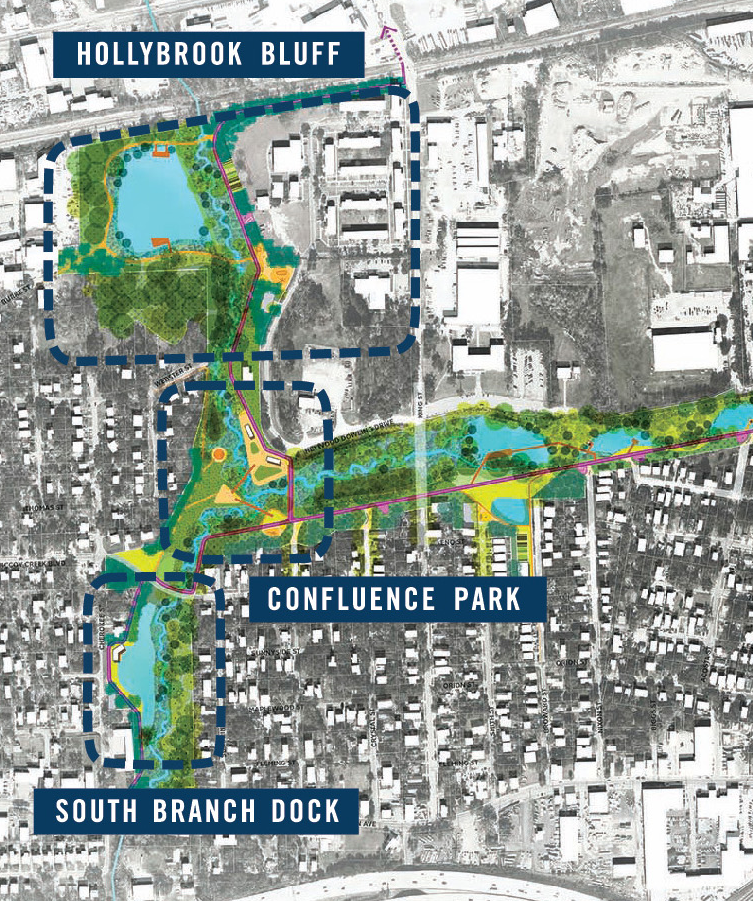
Groundwork Jacksonville has been awarded two grants from the National Oceanic and Atmospheric Administration (NOAA) for the restoration of Hogans and McCoys Creeks totaling more than $5.7 Million. The grants are part of $265 million in funding for 38 transformational habitat restoration and coastal resilience projects this year, to help protect coastal communities and ecosystems from the impacts of climate change and make significant strides in the recovery of threatened and endangered species.
“Part of Jacksonville’s charm and appeal is its wealth of natural resources and shoreline,” said Mayor Lenny Curry. “It is crucial that we protect and enhance our natural resources when building up and connecting our neighborhoods. I applaud the work Groundwork Jacksonville is doing to help restore our city’s creeks and ensure a safe, resilient, and more connected Jacksonville.”
According to NOAA, these projects will have a transformative impact across the country, through:
- Capstone projects that build on decades of work in priority watersheds
- Innovative projects that implement cutting-edge restoration techniques
- Groundbreaking efforts that restore habitat in urban ecosystems to benefit underserved communities
NOAA awarded Groundwork Jacksonville $2.95 Million for the Hogans Creek restoration project to fund the following:
- $1.9M to complete the creek design which is currently at 30 percent. The NOAA grant is in addition to $5.85 Million awarded to Groundwork last year for Hogans Creek design by the National Fish and Wildlife Foundation (NFWF) National Coastal Resilience Fund.
- $600,000 for the Project Development and Environment (PD&E) study to design an Arlington Expressway bridge that will allow for the daylighting of a portion of Hogans Creek that is currently buried. Models show this will be a critical contributor to flood reduction upstream.
- A fish study with the Marine Science Research Institute at Jacksonville University as well as to increase Groundwork’s community engagement and outreach capacity.
- Equipment and salaries for the Emerald Trail Stewards workforce development program.
- Expansion of Groundwork’s Community Restoration Environmental Stewardship Training (CREST) program into Hogans Creek neighborhoods.
In addition, Groundwork Jacksonville was awarded $2.8 Million for construction of the McCoys Creek Branches to restore the natural function of 4,752 linear feet of stream within the creek’s headwaters. The project will create a natural meander within a more deeply excavated and fully vegetated wetland floodplain to improve water quality and reduce downstream flooding.
The Branches construction costs are estimated to be $10.3 Million. Earlier this year, Groundwork Jacksonville in collaboration with the City of Jacksonville (COJ), was awarded a $5.18 Million construction grant through the Florida Department of Environmental Protection (FDEP) Florida Resilient Coastlines Program. The COJ will fund the remaining roughly 25% of construction costs. Design of the McCoys Creek Branches was wholly funded by Groundwork Jacksonville through a grant from the National Fish and Wildlife Foundation (NFWF) and private donations.
About the Urban Creek Restoration
As part of the ongoing effort to develop the Emerald Trail project in Jacksonville’s urban core, Groundwork Jacksonville has partnered with the COJ on the McCoys Creek and Hogans Creek restoration projects. These two urban creeks are listed as the #1 and #2 priority in the COJ’s Local Mitigation Strategy, respectively.
Both creeks suffer from years of pollution, failing infrastructure and development that has encroached on their natural flood plains and both pose severe flooding hazards for nearby roads, homes and businesses even during moderate rainfall.
The ecological restoration of the creeks aims to repair damage and degradation in order to reduce flooding, improve water quality, increase habitat for fish and wildlife, create creek access for active and passive recreation and build resilience through nature-based solutions and green infrastructure.

